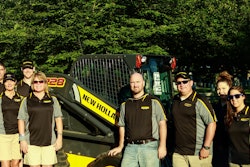The United States has long been branded as the country where Joe Schmo, with a little ingenuity and work ethic, could be anything he wanted to be. He could start his own business and dramatically improve his lot in life. Jill Schmo could too, for that matter.
There are few better examples of this than the landscaping industry. Many of today's wealthiest industry entrepreneurs started landscape companies in their 20s or even teen years. They started small and grew organically. Our cover story, contractor Michael Hatcher in Tennessee, shares such a story. He started his company with a truck and two employees in 1984. Now he has over 100 employees and his company is generating $10 million a year in sales.
While Hatcher plans to continue running his company for many years, some successful contractors eventually decided to sell their companies and "retire" in the prime of their lives. But they couldn't stay retired. They became consultants, authors and speakers. Some started or acquired new companies. Their entrepreneurial gene wouldn't allow them to simply fill their days with golf.
My friend Tony Bass of Super Lawn Trucks is a well-known example. He and I were talking recently about the state of entrepreneurship. He pointed me to an article written by the CEO of Gallup, a news organization specializing in polling and data analysis. The article explained how the U.S. is no longer first in the world for business startup activity (per capita). It's actually 12th. Furthermore, the number of business closures now outpaces startups. This alarming trend was kicked into high gear during the economic downturn of 2008-9, and has not reversed itself thus far.
A similar trend is emerging within the landscaping industry—this same industry where so many of today's most successful, wealthy contractors started with very little in the 1980s and 90s. According to the research firm IBISWorld, the number of landscape companies grew 19% over the two-year period of 2006-2008. Over the next four years (2008-2012), that pace slowed to 10%. Over the next four years (2012-2016), it slowed even further to around 4%.
For those of you who've been at it for a while, you still might feel like there are too many stinkin' landscape companies out there. You're probably right. Given the size of the market, there are definitely a lot of service providers in operation today—the overwhelming majority of which are smaller companies with less than 10 employees. Some will survive, some will not. For those that don't, data suggests that the number of start-ups waiting in line to take their place is growing smaller.
The market for landscaping services is expected to grow, though—especially as the population ages and baby boomers continue to retire. This is your opportunity, and it's up to you if you want to seize it.




















